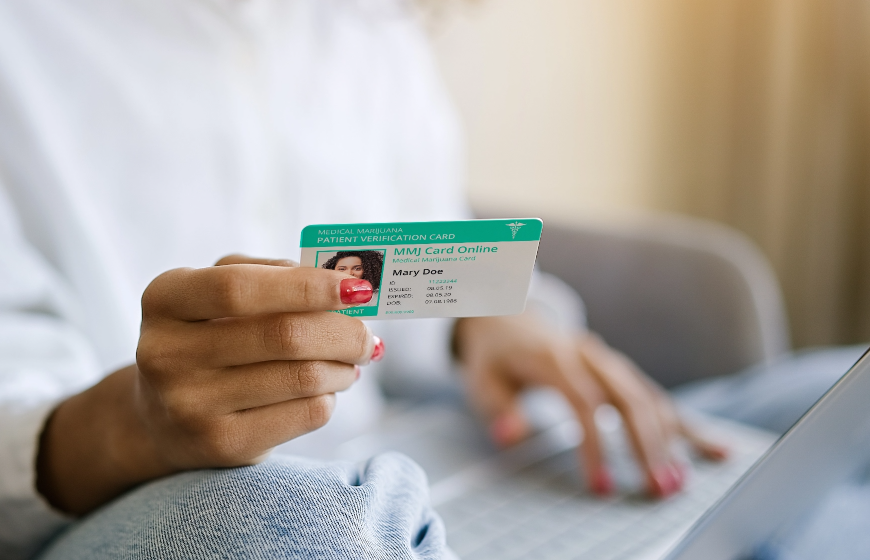How to Get a Medical Marijuana Card in Texas

Schedule An Appointment with a Licensed Physician
Firstly, you need to book a consultation with a physician registered with CURT. MMJCardOnline can connect you with a registered physician quickly, which can significantly speed up the registration process.

Get Approved
If you meet the eligibility requirements mentioned above, and the physician approves you for medical marijuana treatment, they will add your details to the CURT registry and enter a prescription for you into the system.

Visit a Licensed Dispensary
The patient (or their legal guardian) can then visit a licensed dispensary in Texas to obtain their prescribed medical marijuana.
Please note to collect your prescription at a dispensary, the patient (or their legal guardian) must provide the following:
- Valid ID
- The patient’s surname
- The patient’s date of birth
- The last 5 digits of the patient’s Social Security Number
How to Apply for a Medical Marijuana Card in Texas
- A Step-by-Step Guide
- Check your eligibility
- Schedule an appointment with a licensed physician
- Attend your appointment and be certified as a qualifying patient by the physician
- Be added to the CURT system by that physician
- The physician will then enter a medical marijuana prescription into the CURT system
- Collect your prescription from a licensed dispensary in Texas
Texas Medical Marijuana Card Qualifying Conditions
To qualify for the Compassionate Use Program in Texas, you must:
- Be a permanent resident of Texas
- While there is no statutory age limit, minors require the consent of their legal guardian
- Have been diagnosed with a qualifying condition (see list below)
- Be recommended by a licensed physician for medical marijuana treatment
Texas has a list of qualifying medical conditions that make residents eligible for medical cannabis certification. Thus far, the qualifying conditions include:
Patient Qualifying Conditions
- Multiple sclerosis
- Epilepsy
- Autism
- Seizure disorders
- Amyotrophic lateral sclerosis
- Cancer
- An incurable neurodegenerative disease
- Spasticity
- PTSD
- Cerebral palsy
- Parkinson’s disease
General Guidelines
In the following sections, we will provide you with information relating to medical marijuana treatment in Texas.
Medical Marijuana Card Renewal in Texas
Please note that your registration on the CURT system is only valid for a year, and you must be recertified by a licensed physician annually. Therefore, it is necessary to make an appointment with a registered physician before your certification expires to continue using medical marijuana as a treatment for your condition.
Caregiver Rules
As mentioned, minors require the consent of a legal guardian, who, in effect, acts as that patient’s caregiver. For example, the caregiver can assist the patient by obtaining their prescriptions from a dispensary.
When collecting a prescription from a dispensary, the caregiver must provide the patient’s surname, date of birth, and the last five digits of the patient’s social security number. The caregiver must also provide a valid photo ID, such as a driver’s license.
History of Cannabis in Texas
Until 1973, Texas had the strictest anti-marijuana laws in the country. However, House Bill 447 was signed into law that year, significantly reducing the penalties for cannabis offenses.
Texas residents were first permitted to use low-THC cannabis oil in June 2015, following the signing of Senate Bill 339, also known as the Texas Compassionate Use Act, into law by Governor Greg Abbott. The THC limit was set at 0.5% at the time.
House Bill 1535 was signed into law in June 2021. It raised the THC limit to 1% and expanded the list of qualifying conditions to include PTSD and all forms of cancer.
In May 2023, two marijuana bills died in the Texas Senate as lawmakers refused to discuss them. One bill would have decriminalized marijuana; the other would have expanded the MMJ program. Unfortunately, Texans will have to wait a very long time before having a medical marijuana program resembling what dozens of other states have.
Texas Medical Marijuana Laws and Rules
Unless you have Compassionate Use Program protection, you can only use hemp-derived CBD with a maximum THC content of 0.3%. Even those with a doctor’s letter will face serious legal consequences if they violate the program’s terms.
Possession of any amount of weed containing more than 1% THC is a misdemeanor punishable by up to 180 days in jail. If you have 2-4 ounces, your prison sentence will be increased to a year. Possession of more than four ounces is a felony punishable by a two-year prison sentence if convicted.
When charging people with marijuana crimes in Texas, the entire weight of the substance is taken into account. For example, if you have a weed brownie weighing 120 grams, you’ll be charged with a felony.
Selling any amount of cannabis is a misdemeanor punishable by a one-year prison sentence. If you give someone marijuana without receiving payment, this is reduced to a maximum of 180 days.
Cultivation penalties are the same as possession penalties. As a result, growing more than four ounces is a felony. Because a single plant can produce significantly more, cultivating several plants could result in serious prison time. The maximum prison term for possessing or growing more than five pounds of marijuana is ten years.
Unlike states with actual MMJ programs, being on the Compassionate Use Registry only protects you from prosecution if you use a weed-derived product containing up to 1% THC.
What Types of Cannabis Can I Purchase in Texas?
At the moment, the only low-THC products available are those that can be consumed orally or sublingually, such as tinctures, gummies, or lozenges. Keep in mind that the maximum THC content is 1%, and the CBD content should be at least 10%.
Please note that smoking marijuana remains illegal in Texas.
How Much Cannabis Can I Buy and Possess?
There isn’t a set limit on how much you can buy and possess. Instead, it is up to the doctor issuing your certification to make a recommendation of what is suitable for your condition.
Where Can I Legally Purchase MMJ in Texas?
Unfortunately, there are only a few licensed dispensaries in Texas. Texas Original, Goodblend, Fluent, and Thrive Medical Cannabis are among the most well-known.
Can I Take my MMJ to a Different State?
You cannot. Marijuana remains federally illegal under the Controlled Substances Act. It is thus unlawful to travel across state lines with marijuana in your possession.
FAQ About Getting an MMJ Card in Texas
Depending on the availability of a registered physician, it's possible to have an online consultation, receive approval, and be entered into the Compassionate Use Registry in under 30 minutes.
MMJCardOnline users have an extremely high approval rate. However, to increase your chances of success, please read the information in this guide before applying. In the unlikely event you're not approved, you will receive a full refund.